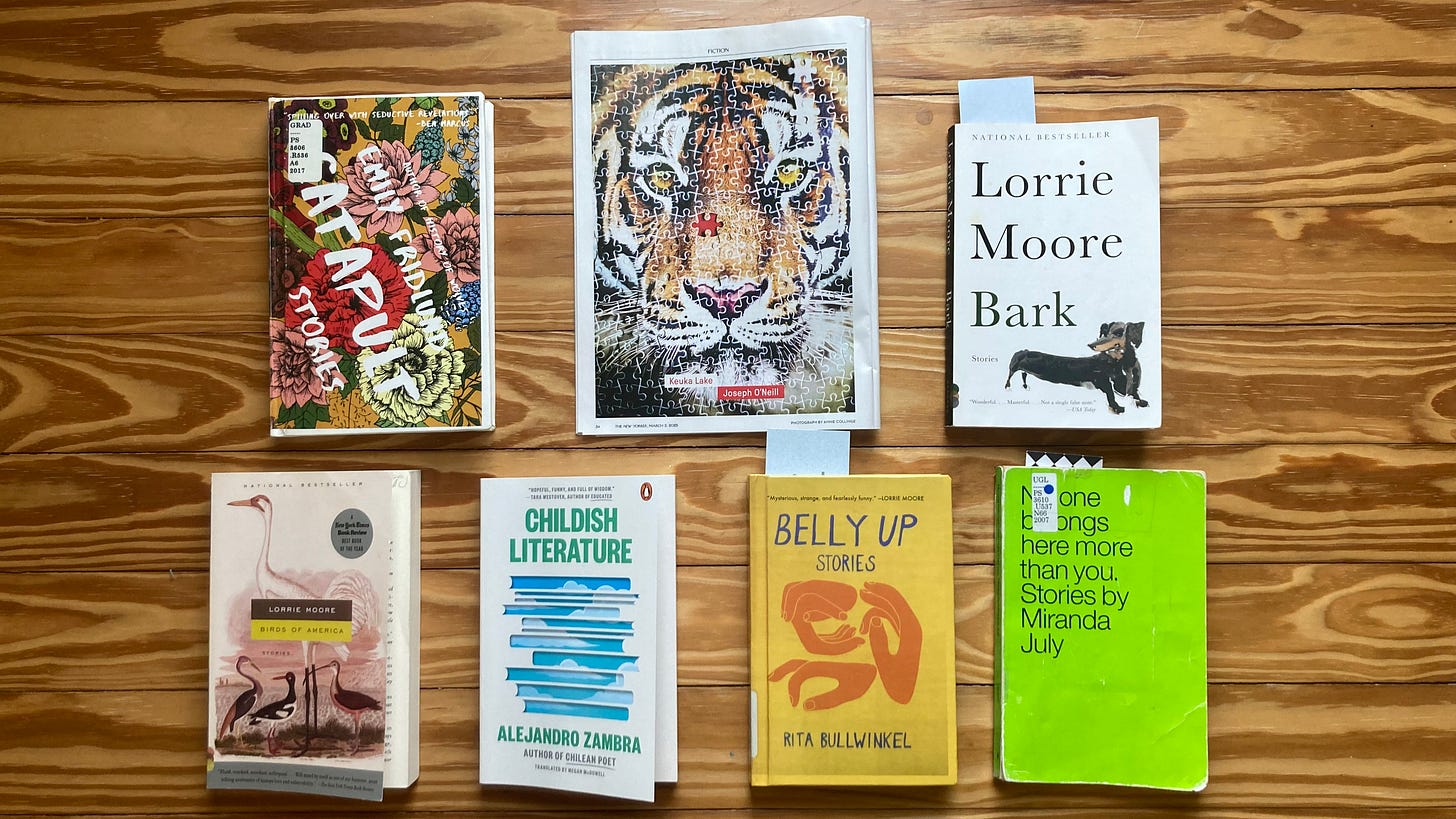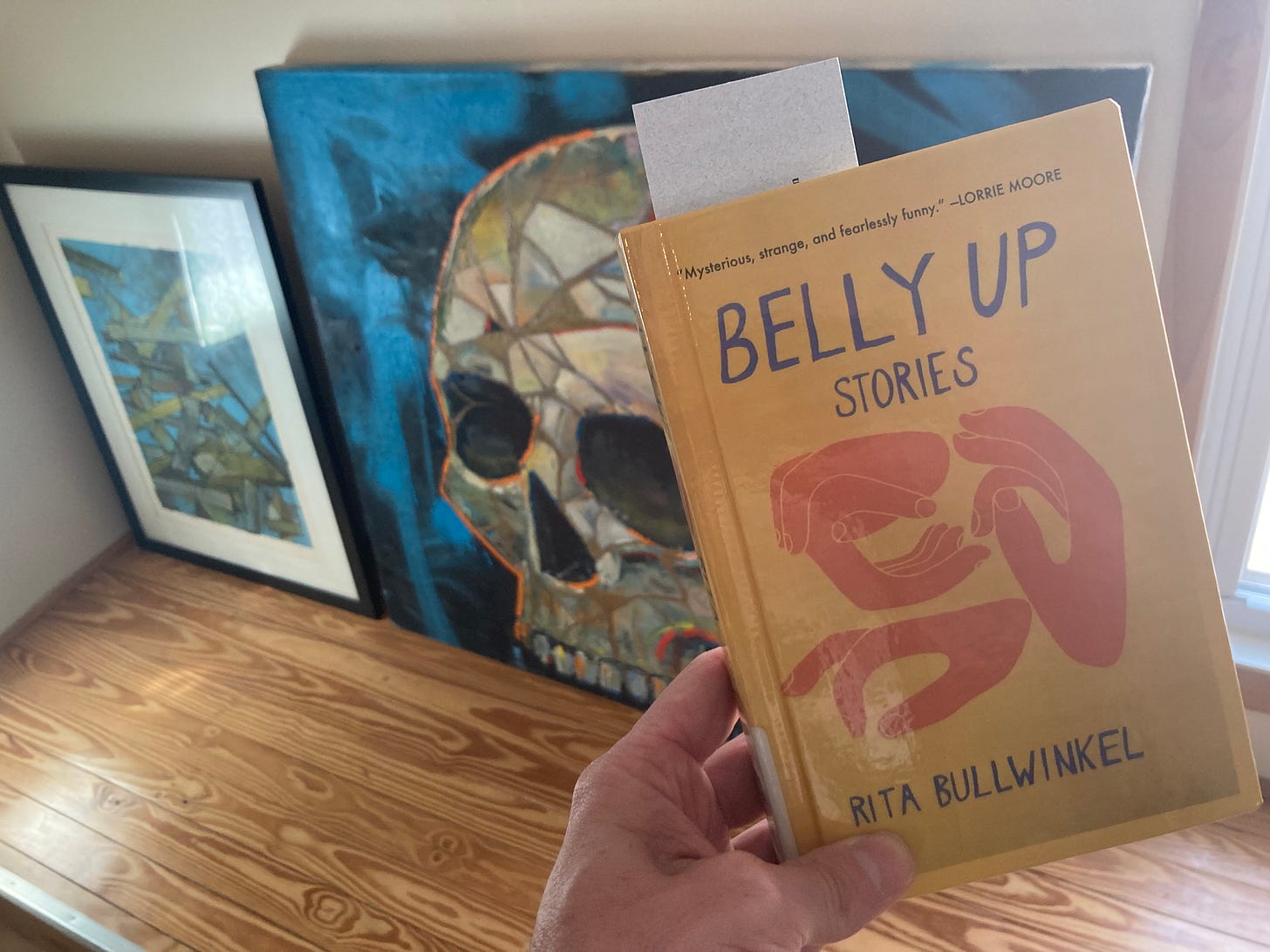2025 week 10 reading log, plus some thoughts on language & word choice
Emily Fridlund, Joseph O'Neill, Lorrie Moore, Rita Bullwinkel, Alejandro Zambra, Miranda July...
I’ve been thinking a lot lately about language.
I teach writing, and write myself, and edit a couple literary journals, where I am working with authors on edits and often reading anywhere from 10-200 submissions in a week (depending on if and when a HAD sub call pops up), so I guess I’m kinda always thinking about language. But it has seemed especially so lately.
*
A couple of weeks ago, I had a dermatology appointment. I’m getting older and have always been pretty moley, and have had a few new… moles and/or spots and/or discolorations and/or the like pop up in the last few years, probably mostly just because of said getting older, but it seemed time to get looked at and have that “probably” confirmed.
The dermatologist looked me over, made note in the system of three or four she wanted to keep an eye on. She kept coming back to one on my chest, specifically. Noted it as something to be aware of… and then ultimately decided to test it.
She described what she was going to do, and then she did it. (Strong essay structure!)
She said she was going to numb the area — I’d feel a poke of the needle, and then maybe a little burning. Then she was going to take a shaving of the mole, which I shouldn’t feel, because of the numbing. She’d send the shaving to a lab and they’d test it and we’d have the results in a few days. Did I have any questions?, she asked.
I didn’t. I often don’t. I’m not that curious of a person, and I often feel unsure of what questions I should have. I didn’t really have any worry or concern to voice or ask about.
Like being not that curious, I’m not much of a worrier. And she hadn’t really seemed too concerned or worried the way she’d described it. I can’t remember if she said it was probably nothing or just acted like it was probably nothing, but I assumed and figured it was probably nothing.
And, indeed, it was. It was nothing! An irregular mole.
But the delivery system for that nothingness being confirmed was an email about the test result. A test result for my “biopsy.”
That word. “Biopsy.” It makes you think of cancer. Or, it does me, anyway. I think it does for most people?
I don’t remember if the doctor had used the word or not, but I don’t think so. I think it would have made me at least a little worried. A little concerned. A little curious. It likely would have prompted a follow-up question or two. Which is maybe why she hadn’t used the word.
But it got me thinking about words and connotations and language.
*
Last year, I started hosting these irregular “short story clubs,” where I pick a favorite story that I want to reread and talk about with people. I announce whatever story I’ve picked for the month, and the date and time, and then whoever is interested reads the story (all who are interesting are welcome!), and we all log on to Zoom just geek out about a story for an hour or two.
The first story we did was Denis Johnson’s “The Largesse of the Sea Maiden.” One of my favorite stories of the century. Probably one of my favorites of all time?
Something I so love about doing these story clubs is how much they make me think even more deeply about these stories I love. Which always makes me love them even more.
Sometimes, while rereading them closely, in order to talk about and to hopefully sound at least a little smart, I notice small things that I might not have otherwise; sometimes someone will say something that I hadn’t noticed or thought about myself. Often those two things collide in really interesting and great and beautiful ways.
Anyway. One small specific thing I noticed and highlighted and we talked about at that first meeting was the power in a story repeating something, but restating or reframing it in a way that makes you see or think about it differently.
The passage that sparked this idea:
Ellis said that he’d felt a fierce, unexpected kinship with this man so close to the end, because, as Mason himself pointed out, this was the last time he’d be introduced to a stranger, except for the people who would arrange him on the gurney the next day and set him up for his injection. Tom Ellis was the last new person he’d meet, in other words, who wasn’t about to kill him.
There’s such a power there in that “in other words”!
“Tom Ellis was the last new person he’d meet… who wasn’t about to kill him” is basically just repeating the same idea as “this was the last time he’d be introduced to a stranger, except for the people who would arrange him on the gurney the next day and set him up for his injection,” but it makes it pop, at least for me, in a new and more gut-punch way.
*
This “move” reminded me of a moment of restating and reframing from my own life, which I tried to capture in my essay, “Landmarks.” The essay is about driving across the country by myself a few years ago, the summer before I got divorced. One piece of that roadtrip was a stop in Utah, where I met my youngest half-sibling. I’m adopted and this was the first time I’d met someone I was related to by blood.
For context, I’d received a phone call a few years earlier from an adoption finder. My bio mom had been hoping to find me, hoping to reach me, hoping to make some kind of connection.
The moment of answering that phone call and talking to the adoption finder:
I pulled over into a church parking lot, parked and turned off my car. She asked if I had any questions. I wasn’t sure if I did, but asked what she could tell me, and for the next five or ten minutes, or maybe half an hour, I don’t know, it all felt like a blur, she told me all kinds of stuff. She said my bio parents ended up staying together. They got married later the same year I was born. They had five more kids. “So, you have five full blood siblings,” she said, which was just a rewording of saying they’d stayed together and had five more kids, but it felt like new information when said it like that. She told me they stayed LDS, and still live in California, which is where I was born, and adopted, and lived until I was five or six. She gave me my bio mom’s home address, her email, her Facebook page, and her phone numbers, both home and cell. I wrote everything down on the back of a paystub I found in my glovebox and then she said it was now up to me how to proceed and then we hung up. And then I kind of… freaked the fuck out.
*
Something I’ve been thinking a lot about — and talking about in workshop this semester — is finding, at least in small moments here and there, ways to word and phrase and notice things in new ways.
Some of my own favorite moments in writing is when an author is able to identify something that is incredibly recognizable, but I’ve never noticed before, or never quite thought about, or never would have worded quite like that.
In workshop, that has sometimes meant identifying language that is cliche, or too vague or general, or just kinda too easy or blah or boring or lazy. And then, not just pointing it out at “bad” or “not working” but seeing it as a moment of opportunity.
Drafts are often full of cliches and lazy phrasings and too vague descriptions and boring language. Drafts should have cliches and lazy phrasings and too vague descriptions and boring language! That’s what they’re for. To get it all down. To give yourself material to work with.
I kind of love those weak aspects in a draft. It is like a big arrow, telling you, “look here.” “Work on this.” “This is something that needs your attention.” But you’re not starting from scratch! You have the idea down. The work now is restating it, reframing it; finding a more interesting, new, unique way to write it!
*
I’ve been grading student essays all this week. Grading is a bear, but my students are great, and so getting to read their writing is also kind of a treat.
This semester, I have two sections of my intro cnf class, “Art of the Essay.” I always start this class with a unit on New York Times-style “Modern Love” essays. Some students write about romantic love, but as in the NYTimes itself, they just as often write about friendship or parents or siblings, and often they haven’t gotten to write about these people in their lives who are important to them, often they haven’t thought that deeply about the relationships, and it feels special getting to encourage them to write about themselves and these people they love, and, every single semester, they make me think anew and even more deeply about my own girlfriend, and parents, and brother, and stepdaughter, and so many others.
The power of these essays is really in this thoughtful curiosity and consideration of themselves and the people in their lives and their relationships with them, but some of that power is in the specificity of details, and images, and moments in scene… and language.
One student wrote about how when people ask her about her necklace she gets to say it is Egypt.
Another student described a sunny day and the slice of light coming into the room through the window.
Another wrote about his dad taking him hunting, and reminding him to squeeze the trigger, not pull.
I love how each of those words — gets, slice, squeeze not pull — made me rethink the sentence and the image and the idea in a way that a different word choice wouldn’t have.
I love thinking about the power of language like that.
the stories I read this week:
Sat. 3/8: “Old House” by Emily Fridlund
I read this, and then maybe on Sunday morning, maybe some other point during the week, I read… enough of the final story, “Learning to Work with Your Hands,” to feel like I could “count it,” and be done with the book.
I didn’t love it. Every story seemed “good” in a way that I could recognize but also in ways where I just realized, and thought over and over, more or less with every story, “this isn’t for me.” So it goes.
*
Sun. 3/9: “Kueka Lake” by Joseph O’Neill
I remember having a few smarter things to say about this story after reading it, but now, a week later, I don’t remember what those things were. This and the above Fridlund story were a couple days in a row of stories that were “good” but I didn’t totally connect with. (Maybe why I jumped into Lorrie Moore next, knowing I was a bit in need of a banger.)
My takeaway memory from the story is this small(ish) plot point about a puzzle. My girlfriend and I have been working on a puzzle the last couple weekends. Progress has been kinda slow, in ways that are sometimes frustrating, but progress nonetheless, in ways that can be really satisfying. Crazy how many things about life this can be true of.
We’re introduced to the puzzle about a third of the way in:
Before Yolanda leaves for work she says, “One thing: don’t touch the jigsaw puzzle.”
The jigsaw puzzle occupies the card table in the corner of the living room. Somebody has made a start on it.
Laurent, Yolanda elaborates, is possessive about his puzzles—displeased if anyone else so much as turns over a single piece. “It’s kind of an O.C.D. thing of his,” she says.
“Of course,” Nadia says.
The puzzle is then revisited another third of the way through the story:
In the morning, Nadia stays in bed until she is certain that the sister and the mimbo man friend have gone. When she achieves this certainty, she makes herself a cup of coffee. It is ice-cold outside, and there’s nothing to do in this apartment—other than the jigsaw puzzle, of course.
…
Hours pass. One takes stock of the jigsaw puzzle. It is more than half complete. Laurent, one calculates, will be back within the hour.
Undo it all, the inner other commands. You’ve had your fun. Now put all the pieces back as you found them. Do it now. There’s still time.
One does not heed this other one. One gathers one’s things and flees to New York a day early.
Later Yolanda text Nadia:
Hi, it was great seeing you. One crazy little thing. L has finished his puzzle but seems to be missing a piece. He wants me to ask if by any chance you saw it around lol. So that’s what I’m doing lol
The story then ends with Nadia retrieving that puzzle piece from her pocket and giving it to someone.
This is only one storyline of the larger whole, but I love it. A small detail, but important, but also not exactly a symbol or metaphor, but also not not a symbol or metaphor. A specific, concrete, physical item, threaded through the story, there for the reader to read into or do with what they want.
*
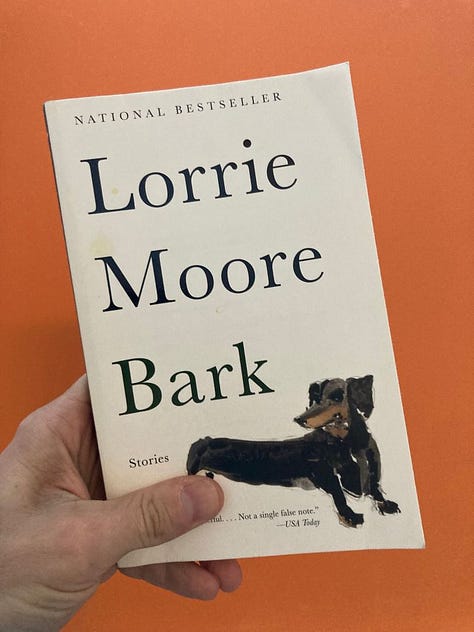

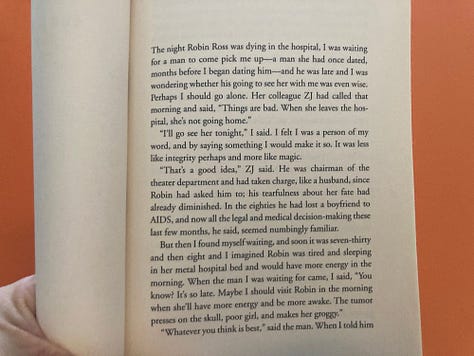
Mon. 3/10: “The Juniper Tree” by Lorrie Moore
I’m not sure I have much specific to say about this story, but it’s great, it encouraged me to read another Lorrie Moore story later in the week, and now I kinda just want to read all of her stories.
*
Tues. 3/11: “Black Tongue” by Rita Bullwinkel
It is interesting reading this after having just read, and so loved Headshot. I’m only three stories into the collection, and all have been “good,” and interesting, but I haven’t loved any. I’m curious which stories will end up most connecting with me, or maybe none quite will and maybe Headshot was just especially aimed at my reader interests, and/or, at least in my reader-eyes, maybe she especially leveled up with her novel. (As proud as I am of my own story collection, Backswing, and my novel, Year of the Buffalo, I definitely feel like I’ve leveled up with my current story collection and novel manuscripts, NOSTALGIA TOURS and THE LAST LOCK-IN, respectively, and am hopeful people get to read them…)
*
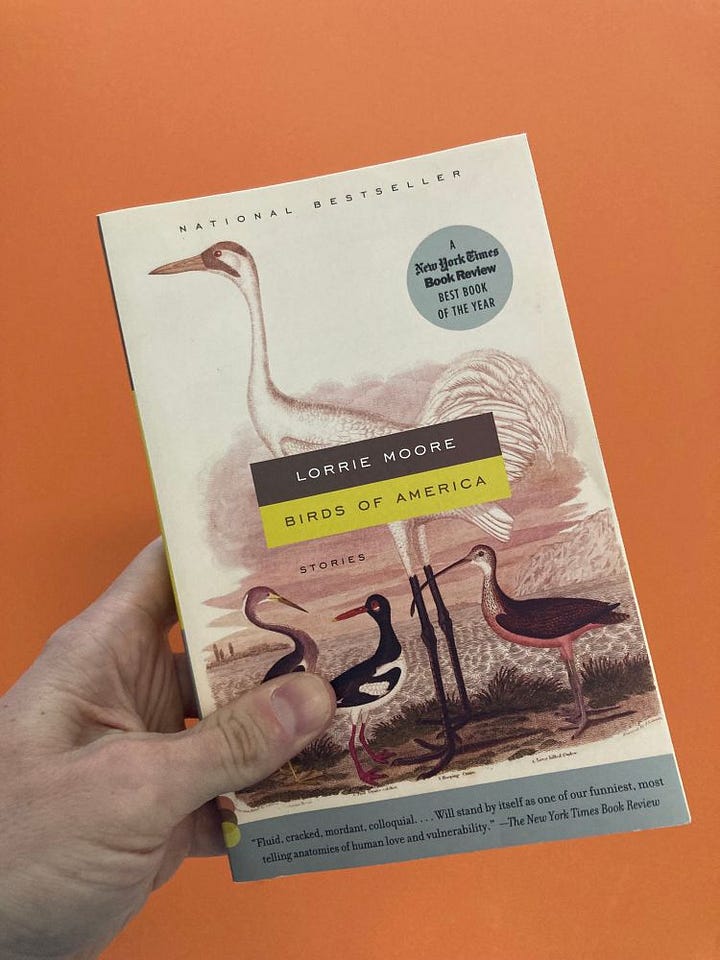
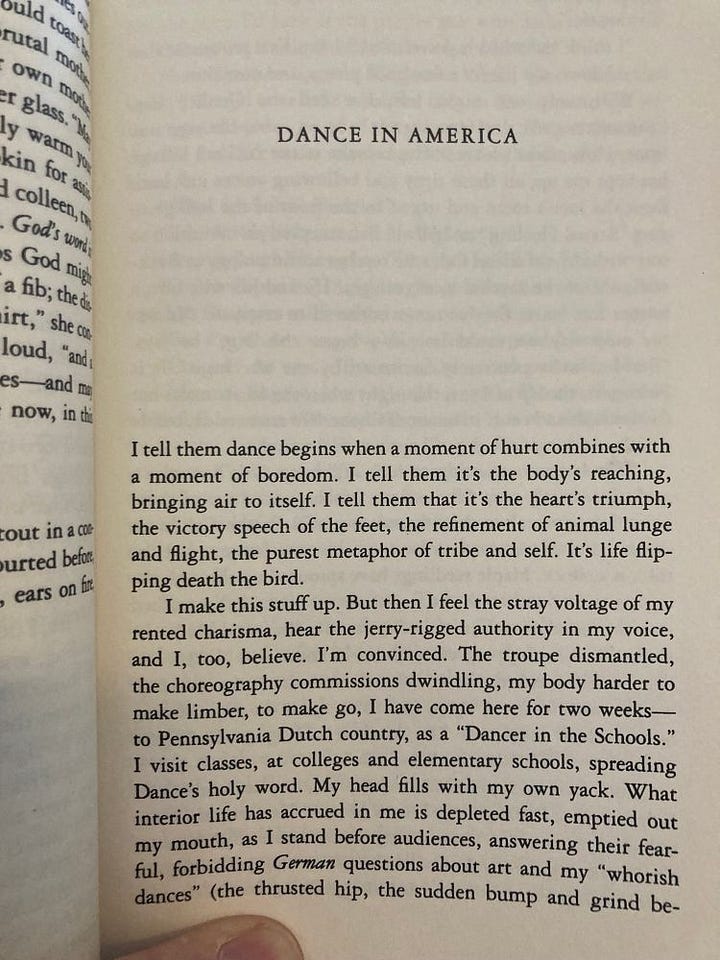
Wed. 3/12: “Dance in America” by Lorrie Moore
After reading “The Juniper Tree” earlier in the week, I tweeted,
Every time I read any Lorrie Moore it reminds me that Lorrie Moore might be my fave writer who I never think of when I think of fave writers and who I don’t read enough of.
A couple days later I read this one, “Dance in America,” and tweeted,
Maybe I’ll just read all of Lorrie Moore’s stories this year…
I don’t know if I actually will or not, but I like the idea. It feels like a good project. Every Lorrie Moore story is weirder and funnier and just better than I’d expected, despite thinking that every time I read her.
So. Year of Lorrie Moore? Maybe!
*
Thur. 2/27: “Jennifer Zambra” by Alejandro Zambra
I’m reading Zambra’s Chilean Poet right now, and interspersing stories here and there from his collection, Childish Literarture, and he’s quickly becoming a new fave writer.
*
Fri. 3/14: “The Man on the Stairs” by Miranda July
Super interesting structure here.
The story is all told from the POV of this woman in bed with her partner, Kevin; he’s sleeping, she hears a noise outside their bedroom. What she assumes is a person sneaking up their stairs. The fear, the uncertainty, the question of whether or not to wake up Kevin… it all becomes an opportunity for a lot of interiority from the narrator. Miranda July being Miranda July, it is all really great, all kinda askew, all both interestingly recognizable and surprising and weird.
But the thing I’ll probably keep thinking about is the structure. And especially the end.
We get 4 paragraphs of present action + interiority.
And then a paragraph of background about her and Kevin’s relationship: “I had a crush on Kevin for thirteen years before he finally started liking me back.” It tells us about their first date, and how they stopped at a gas station on the way to the restaurant for dinner. Paragraph ends with, “As we pulled out of the gas station I stared through my perfect, clean window at the teenager and I thought: I should be with him.”
And then 2 more paragraphs in the present action, culminating in her and the intruder being face-to-face. “My eyes were adjusting and I saw a man, an ordinary man, a stranger. We were staring into each other’s eyes and suddenly I felt angry. Go away, I whispered. Get out. Get out of my house.”
And then, instead of telling us what happened next, we end with one final paragraph back on that first date!
After we pulled out of the gas station, we drove to a restaurant that Kevin thought I might like. But I was still thinking about the boy with the squeegee and I systematically did the opposite of everything that Kevin wanted. I didn’t order desert or wine, just a little salad, which I complained about. But he did not give up; he made jokes, ridiculous jokes in the car on the way back to my apartment. I steeled myself against laughter; I would rather die than laugh. I didn’t laugh, I did not laugh. But I died; I did die.
Huh. I’m not totally sure what to think about or do with that. Which makes me like it. It’s definitely going to stick with me.
Here’s something I wrote this week:
Alas, this post was the only thing I wrote this week.
Well, this post and a lot of student essay feedback.
This is week 10 of the semester and is the first Friday I didn’t write. Not writing today feels like a bummer; but having made it this far feels like a success! I’m going to focus on the latter.
I could (should?) have worked on my novel some instead of this, but I’ve had some of these ideas in my head all week, and really wanted to get them down.
It’s also not yet quite noon right now as I’m writing this (though will probably be late afternoon by the time I go back and fill in all my “TK”s above and hit send), and so I could (should?) write at some later point today still… but it’s beautiful out today, the nicest and warmest day of the year yet, and so I really want to get outside and go on a long run and take advantage of it, and, too, other than this post and the run, I really need to grade. It’s that point in the semester!
So, I’ll publish this at some point, and will go on a long(ish) run at some other point, and will hopefully knock out as much grading as possible throughout various other points, and then do a little more grading tomorrow and Sunday… and then will hopefully be mostly caught up(ish) with class stuff, and so next week will be back to the novel!
*
Thanks for reading. Any fave reads of your own this week?
—Aaron


